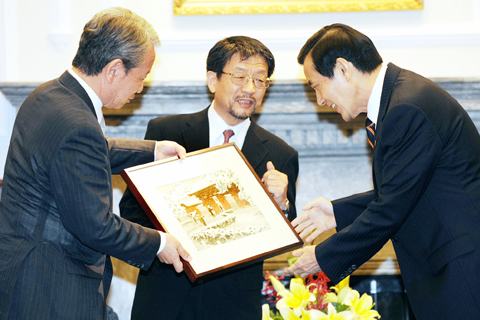President Ma Ying-jeou (馬英九) yesterday said the Economic Cooperation Framework Agreement (ECFA) recently signed with Beijing was not an international agreement because the relations between Taiwan and China are not those of two countries.
“We do not recognize China as a state, so our relationship with each other is not one of country-to-country,” he said.
“Cross-strait agreements are not international treaties signed between two countries, but they are very similar,” Ma added.

PHOTO: CNA
Ma made the remarks while meeting Japanese academics specializing in cross-strait affairs from the University of Tokyo at the Presidential Office yesterday.
Ma said his administration signed the trade deal based on the needs of the nation, public support and following legislative oversight.
On the legislative oversight, Ma said Premier Wu Den-yih (吳敦義) would report to the legislature, which would review the agreement clause by clause.
The accord must be voted on in its entirety and the legislature could attach a rider to the agreement if necessary, he added.
Once the agreement clears the legislature, Ma said it would come into effect within six months, during which the two sides will begin negotiations on trade in goods and services, investment protection and dispute settlement.
Ma said he expected future cross-strait negotiations to be more challenging and that his administration would be under more pressure.
“This is just the beginning,” he said.
Facing Beijing’s increasing pressure for military and political negotiations, Ma said he would not negotiate unification with China during his presidency. Nor would he pursue de jure independence or favor settling cross-strait disputes through military means.
Ma said he understood the ECFA was no panacea and that there were risks involved, but the government could minimize the risks and maximize opportunities.
Amid opposition concerns that the administration has compromised Taiwan’s sovereignty during cross-strait negotiations, Ma said Taipei and Beijing have signed 14 agreements and none of them indicated his administration made any political trade-offs or promises.

A preclearance service to facilitate entry for people traveling to select airports in Japan would be available from Thursday next week to Feb. 25 at Taiwan Taoyuan International Airport, Taoyuan International Airport Corp (TIAC) said on Tuesday. The service was first made available to Taiwanese travelers throughout the winter vacation of 2024 and during the Lunar New Year holiday. In addition to flights to the Japanese cities of Hakodate, Asahikawa, Akita, Sendai, Niigata, Okayama, Takamatsu, Kumamoto and Kagoshima, the service would be available to travelers to Kobe and Oita. The service can be accessed by passengers of 15 flight routes operated by

Chinese spouse and influencer Guan Guan’s (關關) residency permit has been revoked for repeatedly posting pro-China videos that threaten national security, the National Immigration Agency confirmed today. Guan Guan has said many controversial statements in her videos posted to Douyin (抖音), including “the red flag will soon be painted all over Taiwan” and “Taiwan is an inseparable part of China,” and expressing hope for expedited reunification. The agency last year received multiple reports alleging that Guan Guan had advocated for armed reunification. After verifying the reports, the agency last month issued a notice requiring her to appear and explain her actions. Guan

GIVE AND TAKE: Blood demand continues to rise each year, while fewer young donors are available due to the nation’s falling birthrate, a doctor said Blood donors can redeem points earned from donations to obtain limited edition Formosan black bear travel mugs, the Kaohsiung Blood Center said yesterday, as it announced a goal of stocking 20,000 units of blood prior to the Lunar New Year. The last month of the lunar year is National Blood Donation Month, when local centers seek to stockpile blood for use during the Lunar New Year holiday. The blood demand in southern Taiwan — including Tainan and Kaohsiung, as well as Chiayi, Pingtung, Penghu and Taitung counties — is about 2,000 units per day, the center said. The donation campaign aims to boost

The Central Weather Administration (CWA) said a magnitude 4.9 earthquake that struck off the coast of eastern Taiwan yesterday was an independent event and part of a stress-adjustment process. The earthquake occurred at 4:47pm, with its epicenter at sea about 45.4km south of Yilan County Hall at a depth of 5.9km, the CWA said. The quake's intensity, which gauges the actual effects of a temblor, was highest in several townships in Yilan and neighboring Hualien County, where it measured 4 on Taiwan's seven-tier intensity scale, the CWA said. Lin Po-yu (林柏佑), a division chief at the CWA's Seismological Center, told a news conference